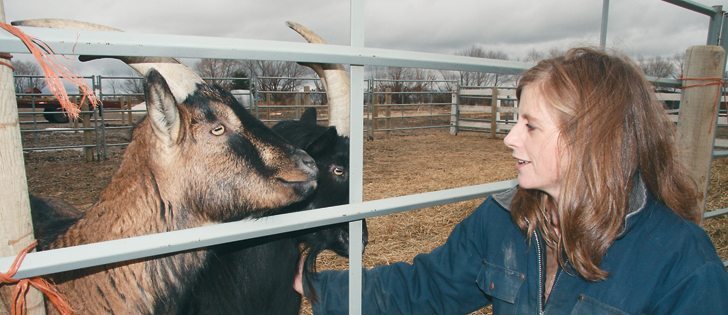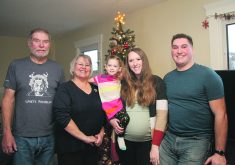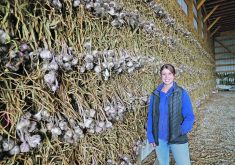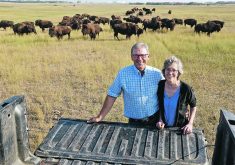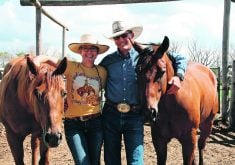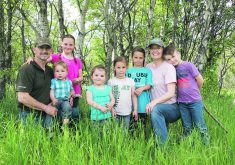Growing grain, gathering eggs, petting goats and feeding pigs are part of school tours offered by Neubauer Farms
MEDICINE HAT, Alta. — Nichole and Mark Neubauer know there’s a gap between urban consumers and rural producers so they are trying to narrow the gap, or at least prevent it from widening.
As more people grow up with no connection to farming, knowledge about the source of food and importance of agriculture is not as easily accessible as it once was.
Neubauer Farms welcomes visitors and school groups to the farm operation, and it has even developed a children’s agriculture education program called Growing Minds.
Read Also

Know what costs are involved in keeping crops in the bin
When you’re looking at full bins and rising calf prices, the human reflex is to hold on and hope for more. That’s not a plan. It’s a bet. Storage has a price tag.
Mark is the silent partner in the agriculture education realm, said Nichole. He works off-farm at a fertilizer operation in nearby Medicine Hat.
“I value him so much because he lets us open up our farm doors and welcome strangers, people that certainly he doesn’t know, to our farm so that we can share this experience with others,” Nichole said.
“When he is on the farm, he’s always scheming and dreaming up new ideas and new ways for our program to develop. He’s kind of like the project manager. He’s the guy in charge of figuring out how we can build something.”
Nichole and Mark have been married for 18 years and have two children, Logan, 11, and Evie, 9.
The Neubauer family has been farming and ranching in southeastern Alberta for more than a century. The original family property is about 12 quarter sections of cultivated and grazing land northeast of Medicine Hat. The couple live on a quarter section just west of the city and farm another 400 acres nearby.
Nichole’s background in special education led her to develop Growing Minds.
“I guess the objective or purpose was two-fold: to let people come to the farm, forming that connection with their food on a really natural level, and then at the same time letting people see what agriculture is all about and celebrating our agricultural roots.”
Approximately 1,500 children visit the farm every year, with 1,600 already booked for 2015.
That many visitors require more staff. Although Logan and Evie assist with tours when they aren’t in school themselves, Nichole and Mark have also hired a facilitator to help.
Setting up the farm for educational purposes and hiring a staff member comes with a cost. There’s a $7 per person fee for children to visit the farm, and much of that cost in recent years has been covered by the Agriculture for Life program, a non-profit organization dedicated to agriculture promotion.
“Our goal always is that when the children leave the farm, they have an answer to two very important questions, the first one being who grows your food and the second one being where does your food come from.”
Visits begin with a group discussion about farm safety and rules. Then Nichole typically works in some kind of story, such as the tale of the Little Red Hen.
“They actually plant grain and we have grains growing in different stages … and at the very end we even pull out a chicken so they get to meet the little red hen.
Gilbert, the garbage-eating goat, is also popular in stories to illustrate the importance of healthy eating. After a discussion, students pick vegetables from the garden and provide Gilbert with a tasty salad.
Goats, chickens, pot-bellied pigs and calves are all part of the educational program.
The outreach doesn’t stop at the school level. Neubauer Farms also operates a community shared agriculture program with 30 to 40 subscribers. Members visit the farm weekly to pick up a basket of vegetables and eggs.
“We started that basically because there was such interest from the families who were visiting the farms with their children on school tours,” she said.
“I know that my job is done if I’ve inspired people to go home and grow their own garden and grow their own food because its not nearly as obscure or challenging as they thought.”
A more recent initiative is the community classroom, where teachers are invited to visit, see what’s available and then plan a future class visit that connects with the curriculum. That can involve two full days at Neubauer Farms.
With her passion and Mark’s vision and implementation, she is sure the farm is doing its part to connect the city with the country.
Contact barb.glen@producer.com


